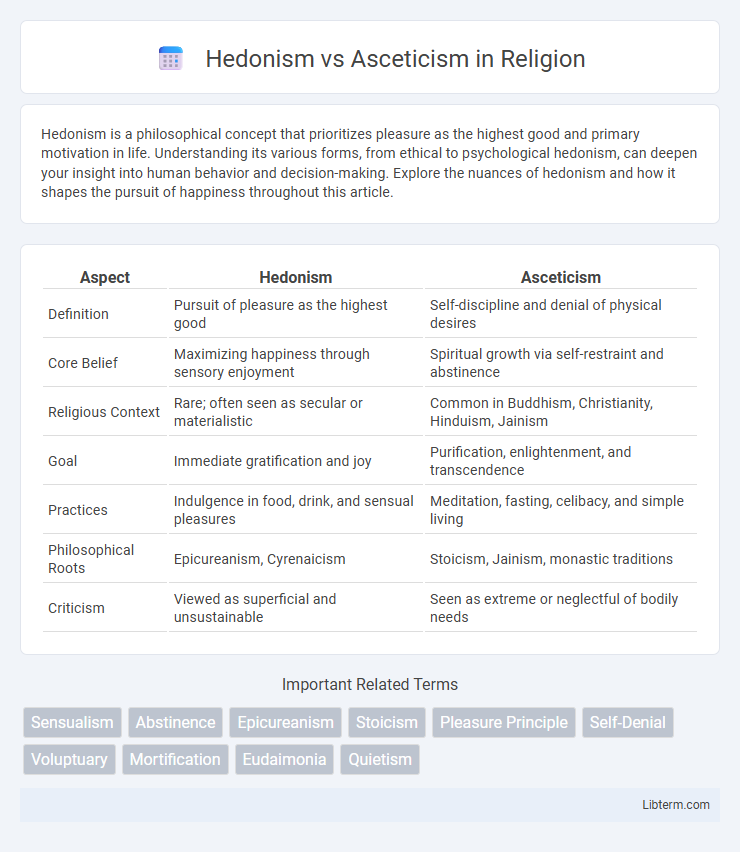Hedonism is a philosophical concept that prioritizes pleasure as the highest good and primary motivation in life. Understanding its various forms, from ethical to psychological hedonism, can deepen your insight into human behavior and decision-making. Explore the nuances of hedonism and how it shapes the pursuit of happiness throughout this article.
Table of Comparison
| Aspect | Hedonism | Asceticism |
|---|---|---|
| Definition | Pursuit of pleasure as the highest good | Self-discipline and denial of physical desires |
| Core Belief | Maximizing happiness through sensory enjoyment | Spiritual growth via self-restraint and abstinence |
| Religious Context | Rare; often seen as secular or materialistic | Common in Buddhism, Christianity, Hinduism, Jainism |
| Goal | Immediate gratification and joy | Purification, enlightenment, and transcendence |
| Practices | Indulgence in food, drink, and sensual pleasures | Meditation, fasting, celibacy, and simple living |
| Philosophical Roots | Epicureanism, Cyrenaicism | Stoicism, Jainism, monastic traditions |
| Criticism | Viewed as superficial and unsustainable | Seen as extreme or neglectful of bodily needs |
Introduction to Hedonism and Asceticism
Hedonism centers on the pursuit of pleasure and the belief that happiness is the highest good, emphasizing sensory enjoyment and personal gratification as key components of a fulfilling life. Asceticism advocates for self-discipline and the renunciation of physical pleasures to achieve spiritual enlightenment or moral purity, often practiced through fasting, meditation, and simplicity. These contrasting philosophies offer distinct approaches to human well-being, with hedonism valuing indulgence and asceticism prioritizing restraint.
Defining Hedonism: Principles and Beliefs
Hedonism is a philosophical doctrine that posits pleasure and happiness as the highest goods and primary motivations in life. Central principles include the pursuit of sensory enjoyment, emotional satisfaction, and the avoidance of pain, guiding ethical decisions based on maximizing individual and collective well-being. Hedonistic beliefs emphasize experiential fulfillment and assert that the value of actions is determined by their capacity to enhance personal pleasure.
Understanding Asceticism: Core Concepts
Asceticism centers on self-discipline, renunciation of material pleasures, and spiritual growth through simplicity and restraint. It emphasizes control over physical desires and detachment from worldly distractions to achieve inner peace or enlightenment. Key practices include fasting, meditation, and voluntary poverty, reflecting a deliberate choice to prioritize long-term spiritual fulfillment over immediate sensory gratification.
Historical Origins and Evolution
Hedonism traces its roots to ancient Greek philosophy, particularly the teachings of Epicurus in the 4th century BCE, advocating pleasure as the highest good. Asceticism, with early origins in Indian and Greco-Roman traditions, evolved through religious movements such as Buddhism, Christianity, and Jainism, emphasizing self-discipline and renunciation of worldly pleasures. Over centuries, both philosophies influenced diverse cultures, shaping ethical frameworks focused on either the pursuit of happiness or spiritual purity.
Philosophical Foundations Compared
Hedonism is grounded in the philosophical belief that pleasure is the highest good and primary motivation of human life, tracing back to thinkers like Epicurus who emphasized the pursuit of sensual and mental pleasures. Asceticism, rooted in traditions such as Stoicism and Buddhism, advocates for self-discipline, renunciation of material pleasures, and spiritual growth as the path to true fulfillment and enlightenment. Both philosophies present contrasting views on human nature and ethics, with Hedonism focusing on maximizing happiness through external gratification, while Asceticism emphasizes inner virtue and detachment from worldly desires.
Hedonism vs Asceticism: Ethical Implications
Hedonism, emphasizing the pursuit of pleasure as the highest ethical good, often raises concerns about potential self-indulgence and neglect of long-term well-being. Asceticism, advocating for self-discipline and restraint, promotes ethical values like moderation and spiritual growth but may limit personal freedom and happiness. The ethical implications hinge on balancing immediate gratification with sustainable virtue and moral responsibility.
Practical Impacts on Daily Life
Hedonism encourages seeking pleasure and comfort, often leading to choices that prioritize enjoyment, such as indulgent eating, leisure activities, and socializing, which can enhance immediate happiness but may impact long-term health or financial stability. Asceticism promotes self-discipline, minimalism, and restraint, focusing on reducing desires and material possessions, resulting in simpler living, increased focus, and potential improvements in mental clarity and physical well-being. The practical impacts of these philosophies manifest in lifestyle habits, decision-making processes, and overall well-being, influencing how individuals balance short-term gratification with long-term goals.
Cultural Representations and Influence
Hedonism and asceticism have profoundly shaped cultural narratives, influencing art, literature, and religious practices across civilizations. Hedonism often appears in works celebrating sensory pleasures and indulgence, such as the Renaissance's embrace of beauty and desire, while asceticism is depicted through spiritual disciplines in Eastern philosophies and monastic traditions. These opposing values continue to inform modern cultural dialogues on the balance between self-gratification and self-denial.
Modern Perspectives and Trends
Modern perspectives on hedonism emphasize the pursuit of sustainable pleasure and well-being, integrating positive psychology principles and mindfulness to balance immediate gratification with long-term fulfillment. Contemporary asceticism often adapts to minimalist lifestyles and digital detox practices, prioritizing mental clarity, self-discipline, and environmental consciousness over traditional renunciation. Trends reveal a growing interest in hybrid approaches that combine mindful enjoyment with intentional restraint to optimize holistic health and life satisfaction.
Finding Balance: Integrating Pleasure and Discipline
Finding balance between hedonism and asceticism involves integrating pleasure-seeking behaviors with disciplined self-control to achieve well-being. Hedonism emphasizes the pursuit of immediate gratification and sensory enjoyment, while asceticism advocates for restraint and minimalism to cultivate inner peace and long-term fulfillment. Combining these approaches allows individuals to enjoy life's pleasures mindfully while maintaining structure and moderation to prevent excess and burnout.
Hedonism Infographic

 libterm.com
libterm.com